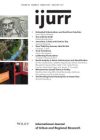This article links contemporary critiques of regional governance to the ‘crisis of the state’ in the 1970s and 1980s. Using the example of the politics of sprawl, I explain why collaborative regional planning institutions in New Jersey and the East of England have received such low marks from government participants and local populations, despite their success in completing land‐use plans. I argue that these new governance institutions inadvertently revive issues of power, accountability and democratic legitimacy stemming from the crisis of the state. British and American governments interpreted it as a crisis of ungovernability, and their subsequent reforms were aimed at freeing state and market from societal demands. Berger, Castells and Harvey argue that, for many citizens, the crisis had more to do with the impermeability of the state to non‐economic quality of life concerns. Regional planning institutions rekindle this critique by offloading policy accountability to the regional level — from above in the UK case, from below in the USA case — while leaving the underlying power of state or market intact. Moreover, the ‘post‐political’ nature of the collaborative institutions prevents competing values from being debated and resolved. The result is a reemergence of legitimation issues around land use.
Details
Written by:
CAROL HAGER
Digital Object Identifier (DOI)
10.1111/j.1468-2427.2010.01017.x
About DOI
Read full article as PDF
Read full article as HTML
See the references for this article
